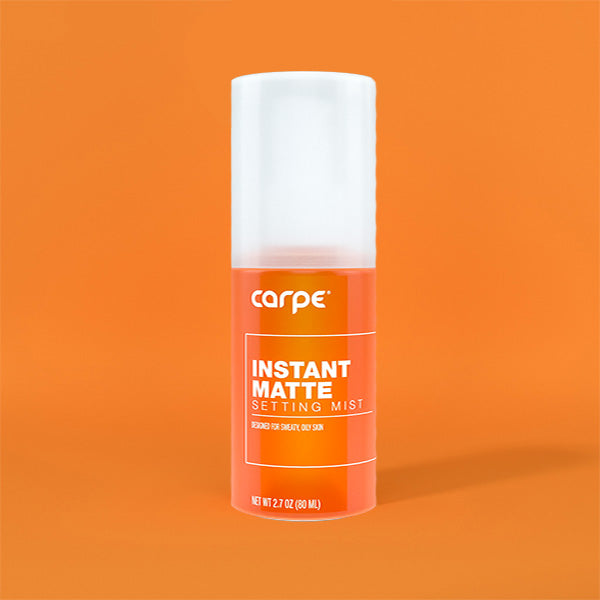Struggling with a sweaty brow, face, forehead? You are not alone.
Sweaty face is the number one search around sweat control and affects almost a quarter of the population.
It might be hyperhidrosis.
THE STATS
According to an article published in the American Journal of Clinical Dermatology, about 22.8% of people who have excessive sweating deal with sweating on their face and head.[1]
CAUSES
But what causes excessive sweating on the face and head?
Sometimes it can be the result of intense heat or exercise, but if you are sweating profusely for no obvious reason - you may likely be dealing with a form of hyperhidrosis.
Hyperhidrosis is just a big word to describe sweating more than your body needs in order to regulate your temperature and stay healthy.
The type of hyperhidrosis that affects the face and head is medically known as craniofacial hyperhidrosis.
Craniofacial sweating usually happens on the:
- forehead
- scalp
- nose
- chin
- cheeks
- brows
If you have hyperhidrosis, your sweating may be influenced by levels of anxiety and stress - but often (and somewhat frustratingly) it may have no obvious cause.[1]
There are three types of hyperhidrosis that are known to cause excessive sweating of the face and head:
- primary focal hyperhidrosis
- secondary generalized hyperhidrosis
- gustatory sweating (Frey’s syndrome)
Face and Head Sweat Types
Primary Focal Hyperhidrosis
One of the most common causes of facial and head sweating is called primary focal hyperhidrosis.
It is a condition that causes people to sweat in excess of what is needed by their body.
Primary hyperhidrosis affects specific parts of the body like the hands, feet, underarms, and face. About 7 million people in the US have hyperhidrosis, so the condition is quite common.[2]
Researchers aren’t exactly sure why primary focal hyperhidrosis occurs, but they suspect that it is caused by an overactive nervous system.
The sympathetic nervous system activates the sweat glands and is responsible for the “fight or flight” response. When the sympathetic system is activated at inappropriate times it can cause sweat glands to become overactive.[3]
Hyperhidrosis is suspected to be somewhat hereditary.[2]
Secondary Generalized Hyperhidrosis
An excessive sweating face and head can also be caused by another type of hyperhidrosis called secondary generalized hyperhidrosis.
This is sweating that occurs all over the body due to an underlying condition.
Secondary hyperhidrosis means there is another health condition or medication that is causing your excessive sweating.
Secondary hyperhidrosis usually begins suddenly during adulthood, as opposed to primary focal hyperhidrosis, which typically develops during adolescence.
You can experience excessive facial and head sweating from secondary hyperhidrosis, but if you have this condition you will most likely also experience excessive sweating on other parts of your body at the same time.
It is important to seek medical attention if you think you have secondary hyperhidrosis (and don’t know the cause), because it can be the result of an underlying factor.
There are certain diseases and conditions that cause secondary hyperhidrosis, which range from benign to more serious. There are also many medications that can also cause secondary hyperhidrosis as a side effect.[2]
If you think you have secondary hyperhidrosis, don’t panic, but please talk to your doctor so you can get more information and take control of your sweat.
Gustatory Sweating (Frey’s Syndrome)
Most people will never have to deal with this condition, but it can be a surprising cause of an excessively sweating face.
Unlike primary focal hyperhidrosis and secondary hyperhidrosis, gustatory sweating is quite uncommon.
Gustatory sweating is when you experience excessive sweating and flushing on your face when you’re eating.
It can even happen as a result of someone thinking about food!
It is most often caused by an injury to the parotid gland and its associated nerves. This little known gland is located near the sides of the face and can be affected by an injury to those areas. After an injury those nerves struggle to regrow in the proper place and communication signals are affected.
Essentially, the body responds inappropriately to stimuli after an injury or disease damages the nerves. It is unlikely that gustatory sweating is the cause of your sweating woes, but if these symptoms sound familiar you should check with your doctor and find out. [2]
SOLUTIONS
Thankfully, there are effective ways to reduce and stop facial sweating so that it doesn’t have as big of an impact on your quality of life.
Are you still curious about whether you have hyperhidrosis? Take this quiz.
Sources
- Nicholas, R., Quddus, A., & Baker, D. M. (2015). Treatment of Primary Craniofacial Hyperhidrosis: A Systematic Review. American Journal of Clinical Dermatology, 16(5), 361-370. doi:10.1007/s40257-015-0136-6 Retrieved March 14, 2019, from https://www.ncbi.nlm.nih.gov/pubmed/26055729
- Pariser, D. M. (2014). Hyperhidrosis (4th ed., Vol. 32). Philadelphia, PA: Elsevier. Retrieved from https://www.elsevier.com/books/hyperhidrosis-an-issue-of-dermatologic-clinics/pariser/978-0-323-32607-0
- Huddle, J. R. (2014). Hyperhidrosis: Causes, Treatment Options and Outcomes. New York, NY: Nova Science. Retrieved from https://www.bookdepository.com/Hyperhidrosis-Janine-R-Huddle/9781633215160






16790753702383.jpg?v=1679075372)

16790746985853.jpg?v=1679074700)


16790757289763.jpg?v=1679075731)









